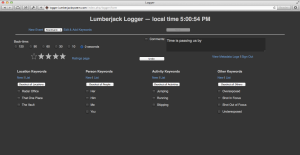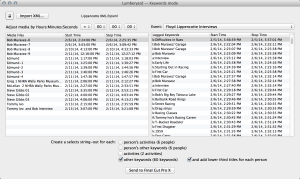Lumberjack the Metadata Logger
6 May 2014A new era of editing has begun! On May 6th, Philip Hodgetts and team introduced the Lumberjack System for Final Cut Pro X. Lumberjack is a real-time logging and pre-edit tool for Final Cut Pro X.
So what does that mean? The first two steps in file-based editorial are ingest and organization. On a narrative project, there are often script notes and camera reports to help with the logging process. However, on non-scripted projects, the entire logging and note taking process takes place while watching the footage in editorial.
To help with the process, companies like Light Iron and Copra have made tools for footage review and on-set logging that takes place during playback. However, there isn’t always time to playback all of the footage and make notes on the day. That’s where Lumberjack comes in.
 Using either Lumberjack’s web interface, or the iOS app, production teams can log footage as it is being shot using keywords, ratings, and comments. Since Lumberjack uses time-of-day as a reference, logging can take place while a device is either online or offline. If a device is offline, the logging data will sync the next time an internet connection is made.
Using either Lumberjack’s web interface, or the iOS app, production teams can log footage as it is being shot using keywords, ratings, and comments. Since Lumberjack uses time-of-day as a reference, logging can take place while a device is either online or offline. If a device is offline, the logging data will sync the next time an internet connection is made.
Probably the coolest part of using Lumberjack is the use of keywords. Per project, users can make an infinite number of keywords in one of four categories: Locations Keywords, Person Keywords, Activity Keywords, and Other Keywords. For shows with multiple cameras or crews shooting at once, Lumberjack allows multiple loggers to work at once. Once logging is completed on set, the Keywords logged on set can be used as ranged Keywords in Final Cut Pro X.
 To get logs from Lumberjack to Final Cut Pro X, editors will use Lumberyard. To sync footage with Lumberjack logs, the footage must first be ingested into Final Cut Pro X. The editor then creates an Event XML which is imported to Lumberyard. The editor selects a Lumberjack log with which to sync, fixes any time-of-day offsets between the footage and the log, tells Lumberyard which types of Keywords to send to FCPX as string-outs, and designates whether or not Lumberyard should create basic lower-thirds for each Person Keyword.
To get logs from Lumberjack to Final Cut Pro X, editors will use Lumberyard. To sync footage with Lumberjack logs, the footage must first be ingested into Final Cut Pro X. The editor then creates an Event XML which is imported to Lumberyard. The editor selects a Lumberjack log with which to sync, fixes any time-of-day offsets between the footage and the log, tells Lumberyard which types of Keywords to send to FCPX as string-outs, and designates whether or not Lumberyard should create basic lower-thirds for each Person Keyword.
Lumberyard then creates a new event in Final Cut Pro X with ranged keywords on their corresponding clips. String-outs of related keywords are put into compound clips. Ratings also show up within FCPX keyword collections. Specific comments are found in the notes of a clip.
The Lumberjack system can save significant amounts of time in post-production, making it well worth its cost. Users can signup at LumberjackSystem.com/signup for $9.99 per month with a yearly subscription or $25 per month without a commitment.